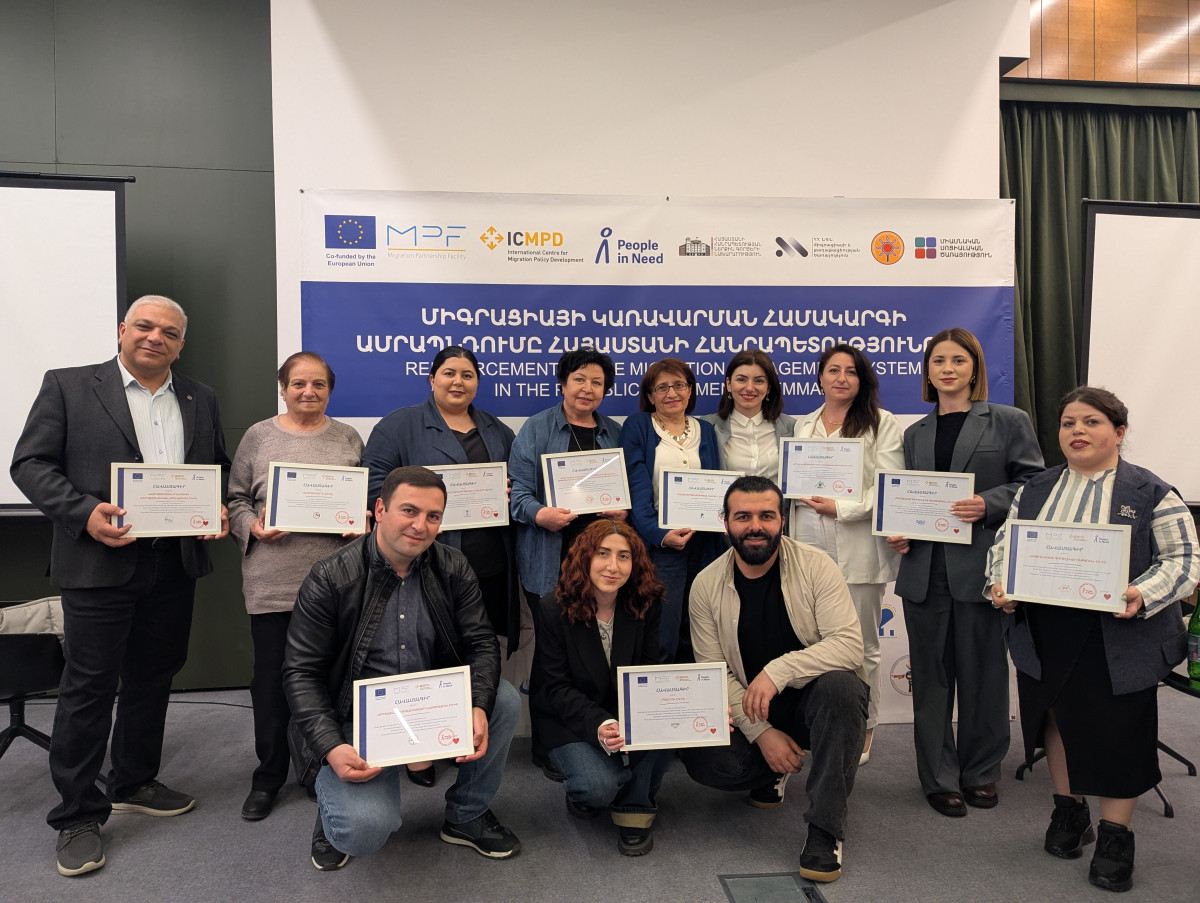Strengthening the Migration Management System: 1,800 People Have Already Benefitted From Improved Public Services
Published: Apr 28, 2025 Reading time: 3 minutes Share: Share an articleThe closing conference of the project “Reinforcement of the Migration Management System in the Republic of Armenia,” implemented by People in Need, was held on 23 April 2025 in Yerevan. The event showcased the project’s key achievements and underscored its impact on supporting the people of Armenia, local civil society and state institutions. The event also highlighted the project’s contribution to enhancing the resilience of civil society and the responsiveness of public services.

The opening remarks were delivered by Jan Plesinger, Counsellor, Head of Political, Press and Information Section of the Delegation of the European Union to Armenia; Armen Ghazaryan, Deputy Minister of Internal Affairs of Armenia; Anna Zhamakochyan, Deputy Minister of Labor and Social Affairs; Oleg Chirita, Deputy Head, ICMPD Brussels Mission/ Head of Unit, Global Initiatives; and Šimon Pánek, CEO and Co-founder of People in Need. The speakers emphasised the crucial role of such initiatives in reducing irregular migration, supporting the reintegration of returnees, and fostering social cohesion.
The conference brought together a wide range of stakeholders, including representatives from various Armenian government agencies, regional authorities, international organisations, diplomatic missions, and civil society. Their active participationemphasised the project’s whole-of-government and multi-stakeholder approach, aimed at fostering inclusive and coordinated migration governance.
In recent years, Armenia has faced evolving migration dynamics. While migration to the EU often places Armenian nationals in irregular situations, the country is also receiving increased numbers of displaced people, asylum seekers, and foreign nationals. In this context - and in light of the EU-Armenia visa liberalisation agenda - developing a comprehensive and effective migration management and integration system has become a national priority.
The 20-month project was co-funded by the European Union under the Migration Partnership Facility (MPF) and implemented by the International Centre for Migration Policy Development (ICMPD). People in Need led the project in collaboration with Armenia’s Ministry of Internal Affairs (Migration and Citizenship Service), Ministry of Labor and Social Affairs, the Unified Social Service, local NGOs, and other partner institutions.
Throughout the project:
• Over 40 public officials involved in migration management and approximately 250 social workers were trained to effectively assist migrants and refugees.
• The project co-funded the establishment of a Call Service Unit within the Migration and Citizenship Service, inspired by a study visit to the Czech Republic and ensuing cooperation.
• The capacities of 19 local civil society organisations were strengthened through sub-grants and mentoring.
• 1,840 individuals across all regions of Armenia received support - including more than 1,400 forcibly displaced persons from Nagorno-Karabakh, over 240 local residents, and more than 160 labour migrants or their family members. Notably, over 500 beneficiaries were children.
• In parallel, the project worked closely with media representatives to promote informed and balanced coverage of migration issues. Through capacity-building workshops, discussions, and the annual “Suitcase” journalism competition, the initiative encouraged high-quality reporting and helped raise public awareness on the risks of irregular migration and the importance of reintegration support.
The panel, titled “The Future of Migration Management and Social Services in Armenia: Sustainability, Cooperation, and Direction,” brought together high-level representatives from the Migration and Citizenship Service, Unified Social Service, Ministry of Territorial Administration and Infrastructure, the EU Delegation, and People in Need.
The panellists emphasised the importance of needs-based, coordinated approaches and robust partnerships between public institutions and civil society. Representatives of sub-grantee organisations also shared their experiences and success stories that were made possible through the project. They shared institutional priorities, good practices, and outlined next steps for strengthening migration governance and social service provision. The importance of continued civil society–government collaboration was underlined as key to ensuring sustainability and inclusive support systems.



